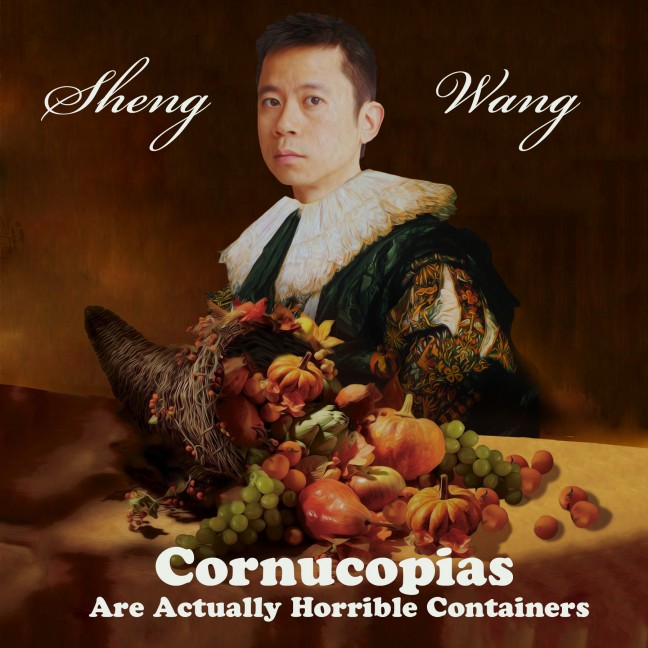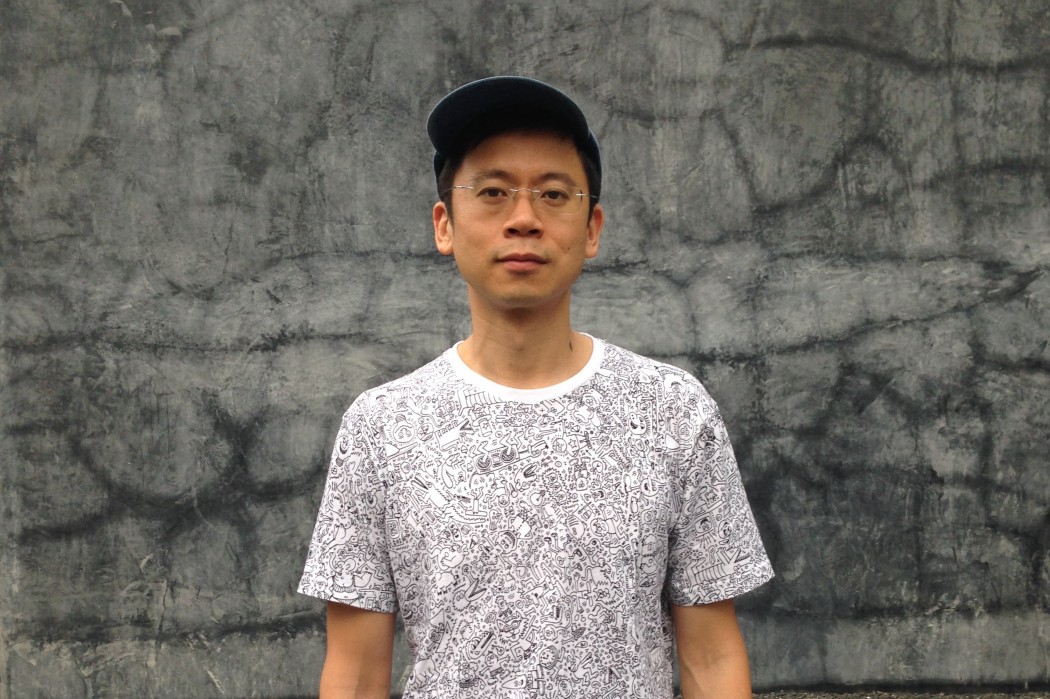The stand-up comedian Sheng Wang grew up in Houston, Texas and is a newly-minted writer for ABC’s Fresh Off the Boat—the first Asian American family sitcom since Margaret Cho’s All-American Girl first aired some 20 years ago. Sheng Wang (whose first and last names rhyme) left Houston as soon as possible to attend UC Berkeley as an undergraduate. What you need to know is that this is outside the norm. Most people who grew up in Texas stay in Texas and live perfectly acceptable lives amidst reasonably priced real estate, conveniently located big box stores, and shameless barbecue and Tex-Mex restaurants (disclosure: I too grew up there). Those of us who managed to escape went into weird things like literary scholarship (my bad) and, in Wang’s case, comedy.
Wang’s humor draws as much from progressive politics as surrealist encounters with household objects. His jokes often remind me of Mitch Hedberg’s highly wrought one-liners. He’s like your smart, aimless friend who mumbles hilarious things half-conscious of what he’s just said. In one of my favorite jokes, he calls a hard-boiled egg procured from his friend’s refrigerator that smells and tastes like fried chicken “way ahead of its time” and “an old soul.”
After graduating from UC Berkeley, Wang hung around the San Francisco Bay Area not really knowing what his next step would be. He had done some stand-up in college, but never anything serious. After a few years of doing open-mics and stand-up, he relocated to New York City, where he performed prolifically, including a half-hour special on Comedy Central and a performance on Late Night with Jimmy Fallon. This year has been especially busy for him. In addition to making it into the top ten on the NBC show Last Comic Standing, he released his first comedy album, Cornucopias Are Actually Horrible Containers (on sale here and here), and moved to Los Angeles to join the writers’ room for Fresh Off the Boat.
We met up just south of Los Angeles at a bistro in Los Alamitos with a surprisingly well-appointed list of IPAs. Over several pints, we talked about growing up in Houston, parents, and dyeing your bangs blond.
—Christopher T. Fan

When did you start doing stand-up? And what were the early days like?
I tried stand-up for the first time at a talent showcase in college. It was organized by a young student group called Theater Rice, which encouraged Asian American kids to experiment with performing arts and provided a supportive community and space. Having the chance to perform there and meet awesome people was what got me to even consider some line of work in entertainment or creative arts.
In the early days, it was kinda hectic because I didn’t know what path to follow. After college, I had ambitions of working in photography, TV and movie production, poetry, and stand-up comedy. I filled my schedule with random internships and jobs and then at night, I would hit open mics and comedy showcases. It was a fun time running around the San Francisco comedy scene. I rolled with other comics who helped me get into the mindset of constantly writing and getting on stage. It was a lot of hustling but we made it fun. After each set—however good or shitty—we’d just hang out, eat burritos and pupusas, talk shop and goof around.
Did you ever think, growing up as an Asian American kid in Houston, that one day you’d be in comedy?
Nope. Growing up, I didn’t have much interest or exposure to TV and pop culture. When I did watch TV, it was usually cartoons, action movies, PBS stuff and X-Files. Besides school and extracurriculars like art class and piano lessons, most of my days were spent running around outside, riding bikes, playing basketball, etc. I had a fun childhood, but wasn’t known to be a particularly funny kid. I definitely wasn’t good at making fun of people or busting balls. I’m still not good at that stuff. Sometimes my sarcasm comes off like sincere statements or my earnestness sounds like sarcasm. Because some folks be all hardened and I might have too much feelings.
What do your parents think about all this?
I think my parents are cool with all this. They appreciate that it’s something creative and makes me happy, but they certainly worry about my financial security. And I get that. It’s a tough, unstable business, and you would ideally have a range of skillsets to increase your chances of success. In addition to learning how to craft funny jokes and write stories, it helps to have great marketing instincts, self-confidence, networking skills, discipline, etc. But all I’ve really wanted to do was work on the comedy part.
Can you talk about how growing up in Houston influenced your outlook on life and how that comes into play in your comedy and writing?
It’s hard to say which parts of my outlook on life stem directly from growing up in Houston. My general outlook on life is that it’s an amazing opportunity to share a little time with living things, and it’s so short so enjoy it as much as possible. I try to stay grateful and live presently. I think that’s why my comedy is generally driven by wonder, exploration—and maybe hope? I don’t like to complain and dwell on negative thoughts or feelings in regular life, so I usually don’t go in that direction on stage. I don’t necessarily avoid darker or more serious material, but I will try to address them with a more optimistic take.
You don’t talk about politics in your comedy, but progressive political views definitely frame many of your jokes (like the one about bachelor parties dehumanizing strippers). Where did this viewpoint develop, and do you see yourself as a socially conscious comic?
Maybe it starts from growing up as an Asian American. Just growing up in a society that is really good at producing and consuming pop culture, but not seeing any faces that look like me and my family. It’s weird because as a kid you feel the effects of being caricatured or invisible in the mainstream media but you don’t really know where it’s coming from or why it’s happening. And then you go through weird identity issues that you don’t know how to deal with, so you act out, do bad things, and dye your bangs blonde. Going to college really helped me develop more social and political awareness and understand the power dynamics of representation and culture. I see myself as someone who’s trying to write comedy that’s creatively fulfilling and at least not politically regressive for Asian Americans or humans in general.
Have mentors played any role in your career so far? How so?
I constantly try to learn from my friends and from people I meet or see perform on stage. When I’m given a new opportunity or when I’m feeling anxious or insecure, I confer with colleagues with more success, experience or delusion, and that usually helps move me in the right direction.
Who are some comics or writers that inspire you?
Dave Attell, Maria Bamford, Robert Hawkins.

Tell us about your comedy album, Cornucopias Are Actually Horrible Containers. Is there any significance to where it was recorded?
This is my first comedy album so it’s kind of a “best of” from my career so far. It’s got lots of jokes that I’m really proud to share, and I think it’s a great representation of my live comedy show. I recorded it at the San Francisco Punchline, which is the comedy club where I started.
Tell us about your experience on the NBC show Last Comic Standing this year, where you were a top-10 finalist.
It was a fun but stressful experience. We got about 3-4 minutes for each of our sets. I wanted to maximize every opportunity, so I was constantly trying to figure out how to put together jokes that worked in the time allotted but also showcased different aspects of my comedy. A few friends advanced through the rounds too, so I had some good company. It was a great opportunity to work in TV and gain more exposure, so I’m happy I got to do it.
What’s next for you?
I’m not sure exactly, but I look forward to evolving and growing creatively and personally!
+ + +
Christopher T. Fan is a co-founder of Hyphen magazine and grew up in Houston near Willowbrook Mall.
This interview is made possible by XFinity.




